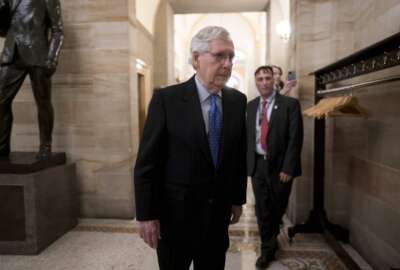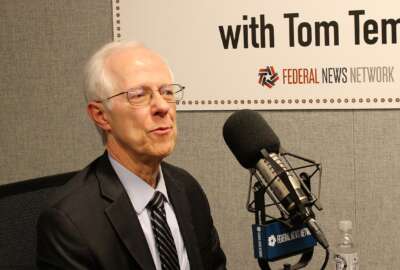
At least Congress was able to keep the trains running on time
If they can avert a rail strike, can they get a federal budget? To get the answer to that big question, Federal Drive host Tom Temin spoke with WTOP Capitol Hill...
Best listening experience is on Chrome, Firefox or Safari. Subscribe to Federal Drive’s daily audio interviews on Apple Podcasts or PodcastOne.
If they can avert a rail strike, can they get a federal budget? To get the answer to that big question, the Federal Drive with Tom Temin spoke with WTOP Capitol Hill Correspondent Mitchell Miller.
Interview transcript:
Tom Temin: I guess a lot of chest thumping was going on at the end of last week for getting the railroad back to the railing the roads not striking. But that’s only the tip of the agenda.
Mitchell Miller: Exactly a lot of pride here as they whip through that rail strike aversion legislation by the House and the Senate in very quick time for Congress, as you know, but that still leaves a huge list of things that they still need to do. And that was an additional thing that they needed to address. So of course, it took up some valuable floor time. And now they still have all the things that they need to do, namely, getting the government funding before the Dec. 16 deadline. So where we are right now is Democrats and the Senate’s top Republican Mitch McConnell want an omnibus that would carry federal spending through the New Year. But with the pending shift in power coming in the House, it’s getting a little more complicated. Conservative Republicans have some other ideas. Senate conservatives last week sent a letter to McConnell calling on him to instead support a short term spending plan. They argue that would give them a better shot at reining in spending, which they believe has been too high and contributed to inflation. Now on the other side, Democrats still hope for an omnibus but House Speaker Nancy Pelosi conceded last week, they might also have to do a year long CR if no agreement can be reached that’s strongly opposed at the Pentagon, as you know, we’re defense secretary Lloyd Austin has made it clear he does not want military programs essentially stuck at their current levels. I spoke with Virginia Senator Tim Kaine who sits on the Senate Armed Services Committee, and he still believes an omnibus can come together, he tends to be a little bit more optimistic than his colleague, Senator Mark Warner from Virginia. But he also acknowledged that for the first time since he’s been in the Senate, he made sure not to commit to any Christmas plans in case Congress goes to the holiday brink. So you can see where they are there.
Tom Temin: Well, you mentioned Mitch McConnell wants an omnibus through the fiscal year or through just the calendar year?
Mitchell Miller: Through the fiscal year, he would actually like if it’s possible.
Tom Temin: That would be the normal appropriations. The question is, can they agree on the levels?
Mitchell Miller: Right, and there’s just so many things there that are being juggled around. Of course, you know, you also, in addition, have President Biden’s proposal for nearly $40 billion in aid to Ukraine and under $9 billion in connection with COVID. And there’s all these things in the air. And when I say it’s not like a few knives in the air. I mean, these are massive budgetary items that they’re trying to figure out. It’s interesting with Mitch McConnell, because on the one hand, he would like to actually get things long term, in part because he really feels strongly about aid for Ukraine and doesn’t want that to die on the vine or get slowed down as the House conservatives come into power in January. On the other hand, he has people within his own conference, who don’t want that to happen. And they want to be able to use leverage on the budget when we get into the new year where Republicans take over the House.
Tom Temin: Sure, yeah. It almost parallels the railroad talks, because they were in negotiations for three years, the industry and the unions, and there was one proposal that got killed last week to extend 60 days more negotiation. Well, if they couldn’t do it in 1,000 days, why would another 60 days help at all?
Mitchell Miller: Exactly. And that’s why I think that one went down in flames fairly quickly, during that vote set.
Tom Temin: I didn’t realize Ukraine spending is becoming a little bit more contentious than it was earlier on in the conflict.
Mitchell Miller: Definitely. I mean, it has really through the entire year has moved fairly smoothly through the House and the Senate, and particularly has strong support in the Senate, especially with Mitch McConnell behind it. But there has been a lot of rumbling in connection with what’s going to happen with the House. The House’s is top Republican Kevin McCarthy, who hopes to become House Speaker is kind of leaning into that issue, saying he doesn’t want to have a blank check on this. That’s in part to appease the House Freedom Caucus, the conservative wing of the party, because he needs their votes to become House Speaker when they vote in January. And there’s a lot of nervousness, I think, behind the scenes from Senate Republicans who really believe that Ukraine needs to keep getting this aid, because they’re worried things can get dragged down during the winter. And there’s a lot of talk about, you know, the heat being cut off and Kyiv and a whole variety of things that could happen militarily that could potentially get Russia back into things where they’ve been on their heels for most of the time. So there is definitely a change, a shift here on Capitol Hill in connection with that issue.
Tom Temin: Sometimes I think it might be more efficient. Let’s just bomb Russia directly and get it over with but I don’t think that’s in the cards here. Right?
Mitchell Miller: I think so either.
Tom Temin: We’re speaking with Mitchell Miller Capitol Hill correspondent for WTOP, but that does bring up an issue for military spending because there is the need to replenish stocks. Of ordinance as well as the weapons platforms.
Mitchell Miller: Right, a lot of people just think, OK, well, they’ve approved this set of, you know, say $25 billion, or another one that was a different amount of money, but they, they are running through all those munitions, all that ordinance. And it all has to be replenished. And in addition to these military issues in connection with Ukraine, if we look at the National Defense Authorization Act, that is going to be coming up this week, and it’s really interesting what’s happening there, because for all the talk about Republicans wanting to cut back on spending, there’s a tentative agreement there to increase the top line for the NDAA by about $45 billion. That’s far from being a done deal. But supporters from Republicans to Democrats say they need to add more money because of inflation, the need to respond to China, as well as the situation with Russia. So negotiators are planning to take it up in the Rules Committee in the House today. And then they hope to eventually get a vote on the NDAA in the House this week, we’ll have to see what happens.
Tom Temin: And let me ask you about the change in leadership for the House. I remember way long ago, when Newt Gingrich (R-Ga.) came in, they had an agenda, I think they called it the Pact for America or Contract with America, it had a name, and it had a big legislative agenda. I’m not seeing that at this point.
Mitchell Miller: No, the Republicans, the House Republicans have made sort of a very loosely organized commitment to America, where they have a lot of very generalized discussions of various topics, but they don’t actually have specific proposals. And they’ve been criticized about that, from Democrats, obviously. But it’s really kind of unclear because of this unwieldy situation with the Republicans not having a major majority like they thought they were going to have in the House, and literally only going to be able to lose maybe four or five votes on particular issues, that that has caused them to have to kind of figure out, OK, we can’t really say we’re going to do this, this, this and this, because I think Kevin McCarthy believes if he gets too specific, he’s going to set himself up for failure, because that is going to be a very unwieldy conference that he is going to be dealing with. So it’s going to be interesting, you’re going to have, you know, very, relatively unexperienced inexperienced party leaders, both from the Republican side and the Democratic side. You know, you have a whole new leadership team on the Democratic side with Hakeem Jeffries, who will be the first black person to lead either party in Congress, he has been a very effective speaker and was unanimously elected last week, but he doesn’t really have any experience, per se, in terms of the actual, you know, grind on the floor and what’s going to get done. And that was where House Speaker Nancy Pelosi, of course, has been able to wield those levers really, really well. Behind the scenes, it remains to be seen whether if he becomes speaker, as expected if Kevin McCarthy can do the same thing on the Republican side.
Tom Temin: Well, last week, it was Kevin McCarthy and his wife that attended the state dinner and not Hakeem Jeffries. And so McCarthy got to have that great Maine lobster. Controversial or not, I would have had a piece if I could have been there. So maybe that’s acknowledgement from the White House that in some ways they’re going to have to work with whatever the house cooks up to be.
Mitchell Miller: Literally what they have to cook up and, and Kevin McCarthy, by the way related to the White House earlier in the week last week, he took a moment where they had the House and Senate leadership meeting with President Biden to talk about the rest of the lame duck and after the Democrats had their moment to speak to reporters, he came out and really laid it on the line on various issues that he indicated that Republicans are going to be taking up: immigration, investigations. He wanted to make it clear that he is setting himself up as the Republican leader and that even though the Senate is still going to be in control of the Democrats, he is going to make a lot of noise for the GOP on his side.
Copyright © 2025 Federal News Network. All rights reserved. This website is not intended for users located within the European Economic Area.
Tom Temin is host of the Federal Drive and has been providing insight on federal technology and management issues for more than 30 years.
Follow @tteminWFED
Related Stories

Federal contractors are already thinking about December 16, when the continuing resolution expires




